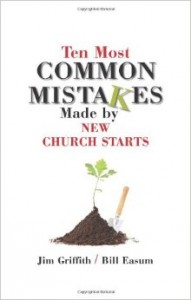Ten Most Common Mistakes Made by New Church Starts (Challis Press, 2008) by Jim Griffith and Bill Easum is a must-read for pastors founding new churches and those who work most closely with them. The authors draw from years of experience with new church starts to outline concisely ten practices that can limit the success of new churches. Given the critical role new church starts play in reaching those not active in church, this resource can help those with the passion, energy, and wisdom to begin a new congregation.
Griffith and Easum pull together here what many have learned in their workshops, consulting, and coaching. In addition to naming the potential mistakes, they offer alternative directions for the planter as well as for supervisors and coaches working with new starts. A recap of the mistakes they cover is below.
- Church planters neglecting the Great Commandment to love God above all in pursuit of the Great
 Commission of making disciples
Commission of making disciples - Failing to take opposition seriously
- Not paying enough attention to the people in the context because of a preconceived image of what the church’s vision should be
- Not having a critical mass before launching
- Vigorous evangelism ending after the early period
- No plan or people in place to work throughout the week with those who attend on Sunday
- Fear of talking about money
- Trying to offer ministries beyond the capacity of a new start
- Formalizing leadership too soon
- Trying to start a church with a borrowed vision
Ten Most Common Mistakes Made by Church Starts is available from Amazon or Cokesbury.







